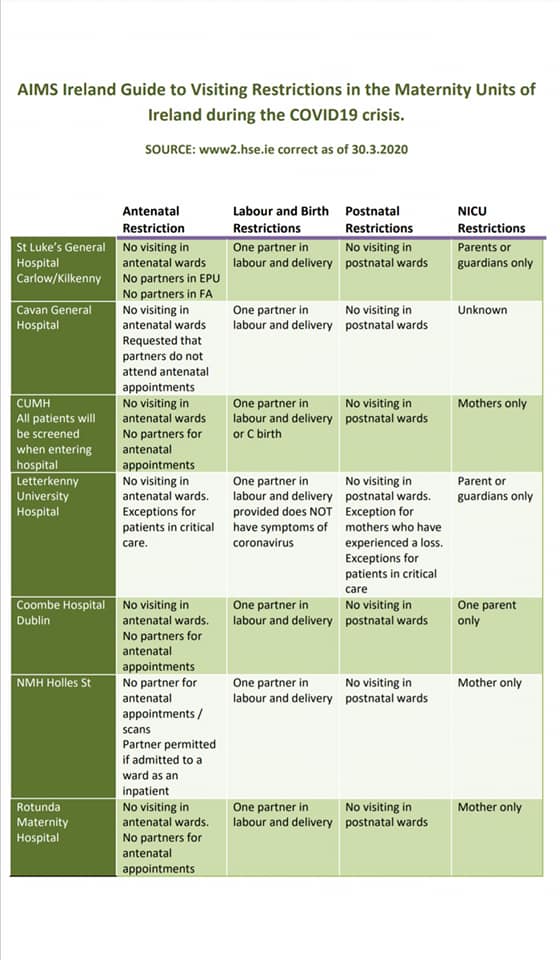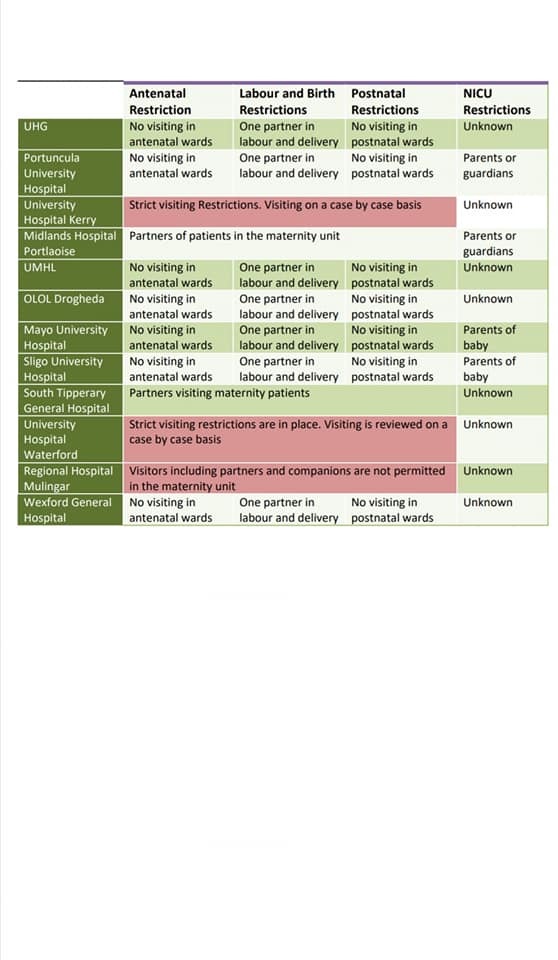AIMS Ireland guide to visiting restrictions in Irish Maternity Hospitals
AIMS Ireland have collated all the information currently available on maternity care restrictions and COVID-19 for all units in Ireland from the HSE.
These are attached here. Source HSE.


These are also available for download as a pdf here
CORRECT AS OF 30.3.2020
Edit#1 1.4.2020 Midwife in Waterford reports no visiting Antenatal wards no visiting Postnatal wards. One partner in Labour/Delivery Ward is general policy
Edit#2 1.4.2020 Midwife in Limerick reports mothers only in NICU
Edit#3 1.4.2020 DOM in NMH reports mothers only for 15 minutes on NICU.
Edit#4 1.4.200 Clinical skills Senior Midwife from South Tipperary reports no visitors in Antenatal wards, no visitors in Postnatal wards. One partner in labour and delivery and for c birth either unplanned or elective. NICU restricted to mothers only on an appointment basis to ensure equal time for all mothers with babies in NICU.
Edit#4 1.4.200 Clinical skills Senior Midwife from South Tipperary reports no visitors in Antenatal wards, no visitors in Postnatal wards. One partner in labour and delivery and for c birth either unplanned or elective. NICU restricted to mothers only on an appointment basis to ensure equal time for all mothers with babies in NICU.
Edit#5 2.4.2020 Public Statement from The Rotunda Hospital. For women or their partners who are COVID-19 positive, have suspicious COVID-19 symptoms, or have had contact with a confirmed case of COVID-19, their partners will not be allowed attend the Rotunda during labour and birth. Rationale: Protection of staff and hospital spaces and also “Given that a new mother with COVID-19 infection may become quite unwell during the postpartum period, it will be crucial for her partner to be kept as healthy as possible at home to care for her and their potentially vulnerable newborn.”
Edit#6 2.4.2020 Rotunda Public StatementFor all women admitted for induction of labour – partners will only be allowed to join the mother when active labour is established and she has been moved to a single-occupancy room. This measure is to reduce the risk of transmission of infection in the Induction ward and across the Hospital.
Edit#7 2.4.2020 Rotunda Public Statement NICU visiting limited to mothers only, for a period of no more than 15-30 minutes per day.
Edit #8 Summer 2020 Dublin Hospitals enabling postnatal visiting for a period of up to two hours. One named partner only.
Edit#9 7.12.2020 HSE announces partners to be enabled to be present at pregnancy scans at maternity hospitals
The restrictions in the Regional Hospital Mulingar fly in the face of the HSE’s own guidelines issued on the 1.04.20, and also in the face of the WHO guidelines. issued on the 18.03.20. They also do not comply with the guidance set out by the Institute of Obstetricians and Gynaecologists on the 3.04.20.
HSE Interim Guidelines on the Management of suspected COVID-19/SARS-CoV-2 in the pregnant and post partum period V1.1 01.04.2020 states:
“Explicit guidance re. attendance of birth partner/accompanying person in delivery suite
Women should be permitted and encouraged to have a birth partner present with them during labour and birth.
Having a trusted birth partner present during labour is known to make a significant difference to the safety and well-being of women in childbirth.
Woman attending for intrapartum care who does not have suspected/confirmed COVID-19
- asymptomatic birth partners are permitted in the delivery suite – they should be asked to wash their hands frequently.
- symptomatic birth partners should remain in self-isolation at home and should not attend the delivery suite. Women should be advised when making plans about birth to identify potential alternative birth partners, should the need arise.
Women attending for intrapartum care with current suspected/confirmed COVID-19 :
- asymptomatic birth partners are permitted in the delivery suite – they should be asked to wash their hands frequently.
- symptomatic birth partners should remain in self-isolation at home and should not attend the delivery suite. Women should be advised when making plans about birth to identify potential alternative birth partners, should the need arise. “
WHO guidelines issued on the 18th March 2020 state:
“All pregnant women, including those with confirmed or suspected COVID-19 infections, have the right to high quality care before, during and after childbirth. This includes antenatal, newborn, postnatal, intrapartum and mental health care.
A safe and positive childbirth experience includes:
- Being treated with respect and dignity;
- Having a companion of choice present during delivery;
- Clear communication by maternity staff;
- Appropriate pain relief strategies:
- Mobility in labour where possible, and birth position of choice.”
AIMS Ireland asserts that no pregnant person should be forced to give birth in the current climate without the emotional support of a trusted birth partner.
AIMS Ireland calls on the HSE and the Hospital Group that the Regional Hospital Mulingar belongs to, to ensure that such unilateral decisions cannot be taken by individual hospitals. A mother’s emotional and perinatal mental health during labour and birth are paramount, and should be protected. Women planning to birth in MRH have contacted AIMS Ireland in their hundreds over the last few days asking what alternative arrangements they can make. Some are choosing planned home birth, others are considering freebirthing, most would be willing to transfer to another hospital.
These women include those who have suffered previous birth trauma, those who have suffered previous sexual abuse, those who have suffered previous still birth and loss, teenagers, and those with perinatal mental health challenges under the care of a mental health professional. It also includes women and pregnant people who are anxious, scared and frightened due to the presence of covid19 in our community whilst they are becoming parents.
To force these people into becoming parents, (one of life’s greatest and most challenging transformative experiences), alone, anxious and terrified is nothing short of inhumane.
If the HSE cannot guarantee a basic service in one of its maternity units in compliance with its own regulations, then the service in that unit should be suspended and pregnant people should be offered alternative hospital care.
Ireland’s maternity services have suffered at the hands of unilateral individualised decisions in the past with the symphysiotomy scandal, the Neary scandal and the scandal in Portlaoise to name a few. These rocked the nation and thankfully led to significant improvements in maternity services.
Notably the scandal in Portlaoise led to the creation of Hospital Groups, The National Maternity Strategy and HIQA’s Standards for Better Safer Maternity Care. This is not the time to revert to unilateral action and abandon these structures when we most need them.
http://aimsireland.ie/%ef%bb%bfcovid-19-virus-infection-and-pregnancy-in-ireland/
http://aimsireland.ie/covid-19-virus-infection-and-breastfeeding-in-ireland/
 AIMS Ireland
AIMS Ireland